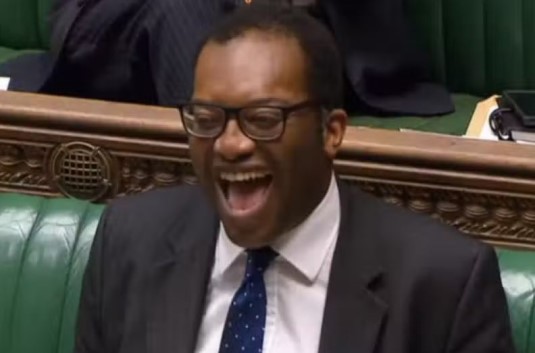
In his mini-budget address, Kwasi Kwarteng declared we were entering into a new era. He was certainly right about that. It's not just the fact the Tory energy price freeze protects the profits of the humongously wealthy suppliers, nor that his income tax cuts shovels more into the gaping maws of the rich, nor that the abolition of stamp duty will be trousered primarily by landlords and property developers, nor that regulation-free special enterprise zones allows for even more tax dodging and higher rates of exploitation, nor that city slickers will toast the lifting of the bankers' bonus cap, nor that it means more punitive hoop jumping for those subsisting on Universal Credit, nor that the vast borrowing has sunk the pound against major currencies, making imports more expensive and stoking inflation. No, this budget, the worst, most retrogressive budget delivered by a chancellor since the 1930s does offer something new - perhaps epochal. This is the first time in its 200 year history that the Conservative Party have stopped pretending to be a party of all of the people, or even a plurality of the people. The ghastly partnership of Truss and Kwarteng have junked the crap and are presenting themselves unapologetically as the party of the rich, of the government of the wealthy by the wealthy. The oligarchy is all that matters. This is the era of naked Toryism.
Image Credit

6 comments:
It's well worth reading Richard Seymour's analysis of this on Patreon.
Link to Richard Seymour's analysis, please, Duncan
Agree!
«Since 1979, it has won elections and governed the country by attacking trade unions, scapegoating and whipping up division, and a concerted, continuing cultural project to individuate, atomise, and disrupt collective resistance before it emerges.»
And here there is the usual confusion between “won elections” and “governed the country”: just like New Labour the Conservatives have “won elections” by delivering huge redistribution based on ballooning housing costs from the lower classes to the upper-middle and upper classes, this has bribed them into accepting the governing programme against labour unions, and reciprocity of social insurance (and since Cameron they have also adopted the “scapegoating and whipping up division” of the woke "centrists").
Mass property rentierism changed electoral politics enabling neoliberal policies, for as long as they are more than compensated by massive property redistribution, "Middle England" voters vote even for governments that push down wages and (occupational) pensions and cut social insurance and public services.
It is property that determines the vote of many millions of "Blow you! I am alright Jack" people who otherwise would vote against neoliberalism. But so many people on the "left" profit so much from property themselves that even if they don't go full neoliberal like the Militant Mandelsoncy, they at best don't notice how powerful property based politics are.
Obviously, Phil, this just goes to show that <> is true and explains everything, regardless of whatever it is you wrote.
I haven't yet decided on my pet theory, but I am weighing up the options, and will be checking these comments for likely candidates.
On the other hand, I could conclude that the world is truly f*cked up and nothing makes any sense anymore. But at least I get to read some interesting analysis of just how f*cked up it is, and have a few candidate catch-all simplistic explanations from some below-the-line contributors. So thanks.
«And here there is the usual confusion between “won elections” and “governed the country”: just like New Labour the Conservatives have “won elections” by delivering huge redistribution based on ballooning housing costs from the lower classes to the upper-middle and upper classes»
Today I figure out a better way to explain the singular obsession of many english (and UK) voters with property prices and rents, because there are *two* types of them:
* The obvious type is the large minority, around 20-40% (or about half of all property owners), that vote on property because they own property where it usually rises is price fastest (large part of the south-Estate). Lots of tax-free work-free profits entirely redistributed from someone else's work is a big voting motivator.
* But there is another story: between voting for a government with a goal to have no homeless or 4-8 people per room, even if that means 5-10% vacancies, and one with a goal of a property market with very few vacancies even if that means 5%-10% homeless or 4-8 people per room, most of the 65% of property owners would vote for the latter, even those who don't directly get huge price or rent increases.
Post a Comment